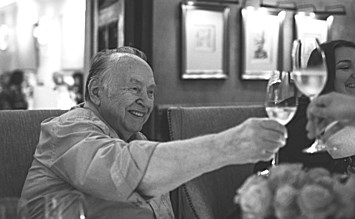
OBITUARY
Edouard Nicolaevich Tsyganov
September 12, 1933 – June 30, 2025

September 12, 1933 – June 30, 2025
It is with profound sorrow that we announce the passing of Dr. Edward Nikolaevich Tsyganov, a beloved husband, father, and internationally recognized nuclear physicist, who died peacefully at home in Duncanville, Texas, on June 30, 2025, at the age of 92.
Born in Moscow, Russia, in 1933, Dr. Tsyganov demonstrated an early passion for science and discovery. He earned his Ph.D. in Physics from Moscow State University, one of the Soviet Union’s most prestigious institutions, and later achieved the advanced Doctor of Sciences degree - a distinction awarded to scholars whose original contributions profoundly influence their field. His early career was marked by rapid advancement in the world of theoretical and experimental physics. He served as Director of High Energy Particles Lab at the Joint Institute for Nuclear Research (JINR) in Dubna, a leading international center for particle physics. There, he oversaw major research efforts and mentored a generation of scientists during a time of global political tension and scientific advancement.
In the 1970s, Dr. Tsyganov played a historic role in the development of peaceful scientific collaboration between the Soviet Union and the United States. Together with Darrell Drickey of UCLA he led the first major step in particle physics collaboration in 1970: a joint high energy physics experiment at the Institute for High Energy Physics (IHEP) in Protvino, about 100 km south of Moscow. This collaborative scientific effort embodied the spirit of détente, taking place two years before Richard Nixon’s 1972 summit with Leonid Brezhnev.
His following groundbreaking work with Fermilab in Illinois was one of the first large-scale, non-military nuclear research partnerships between the two superpowers. His vision and determination helped open channels of trust and cooperation across ideological divides, affirming his belief that science could serve as a universal language and a bridge to global understanding. His role in this collaboration was not only technical but profoundly diplomatic and deeply humanistic.
In the early 1990s, he was invited to join the European Organization for Nuclear Research (CERN) in Geneva, Switzerland, the world's premier center for particle physics research. There, Dr. Tsyganov contributed to the design, simulation, and refinement of accelerator systems and detector technologies that supported the next generation of discoveries in high-energy physics. His work at CERN reflected both his engineering acumen and his enduring curiosity about the fundamental nature of the universe.
Later in the 1990s, Dr. Tsyganov joined the ambitious Superconducting Super Collider (SSC) Lab in Texas. Envisioned as the most powerful particle accelerator in the world, the SSC aimed to unravel the deepest structures of matter and energy. Dr. Tsyganov played a critical role in the design and theoretical underpinnings of this unprecedented scientific effort. Although the project was eventually canceled by the Congress due to government funding cuts, his work helped lay the groundwork for future international collaborations and technological achievements in accelerator physics.
Following the closure of the SSC Lab, Dr. Tsyganov was invited to remain in the United States permanently as an outstanding scientist and continued his career as a Professor of Radiological Physics at UT Southwestern Medical Center in Dallas, Texas.
There, he brought his deep knowledge of nuclear physics to the field of medical science. His research at UT Southwestern advanced diagnostic imaging technologies contributed to safer, more precise uses of radiation in medicine.
In the final chapter of his scientific life, Dr. Tsyganov devoted himself to the exploration of cold fusion, also known as low-energy nuclear reactions (LENR). He investigated the possibility of achieving deuterium-deuterium fusion within crystalline lattice structures — a concept that challenged conventional boundaries of nuclear physics. He published extensively on this work and presented his findings at international conferences, where he remained a thoughtful and independent voice advocating for open-minded, persistent inquiry. Though controversial, his research was always grounded in detailed modeling, deep understanding of quantum behavior, and a lifelong commitment to scientific progress.
Dr. Tsyganov is survived by his beloved wife, Nina A. Tsyganova, and his daughters, Elena Kashiguina and Elizaveta Tsyganova. His family, colleagues, and former students remember him not only for his brilliance and achievements, but for his warmth, integrity, and unwavering belief in the potential of science to improve the human condition.
A private interment will be held at Little Bethel Cemetery, and a public memorial and celebration of his life will be announced at a later date. Those wishing to be notified when details are available may contact Elizaveta Tsyganova at [email protected].
Dr. Tsyganov was not only a man of intellect, but a man of ideals. He believed in the promise of humanity: in reason, compassion, and cooperation as the path forward. His scientific work was always rooted in a deep ethical vision - that knowledge must serve peace, understanding, and the betterment of life on Earth. His legacy endures in the discoveries he helped shape, the lives he touched, and the hope for a future that he never stopped believing in.
Family and friends may share memories and condolences at www.grandprairiefh.com
Show your support
Add a Memory
Share Obituary
Get Reminders
Services
SHARE OBITUARYSHARE
- GET REMINDERS
v.1.18.0